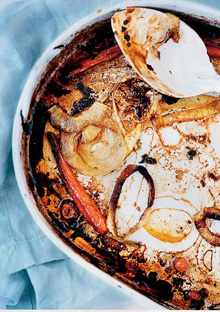Soul-Satisfying, Memorable Meals
Lumps Are Treasures

Photo: Ditte Isager
PAGE 3
By Patricia Volk
On the corner of Tchoupitoulas at 401 Poydras Street in New Orleans, you will find Mother's, home of the Ferdi, a sandwich served with "debris." In Louisiana, debris is crusty scraps that drift to the bottom of the pan when you roast meat. In New York we call that "dirt."I love dirty food. Dirt is the stuff people usually throw out, e.g., the rubbery "skin" on vanilla pudding after it's exposed to cold air in the fridge. Dirt is the dark film that forms as cocoa cools in the pot. Break it up with a spoon, stir it in, you've got dirty hot chocolate, nicely unsmooth and imperfect, hence complex.
There are those who will tell you dirty food does little to enhance presentation. But a dirty brisket sandwich would be torment without pan scrapings. I like seeing and eating something that shows it was made by human hand in a slow old-fashioned way. When I'm eating a lemon mousse, while I appreciate the smoothness, discovering a bit of pulp exhilarates. You never have to strain anything for me. Lumps are treasures, and so are little bits of black fat at the bottom of the roasting pan if onions are in it. In Yiddish, these carbonized fat-soaked threads are known as gribenes. People, families, have been known to fight over them. In France, burnt crumbs that collect at the bottom of the skillet when you sauté floured food is fond. Gribenes and fond are why we have Lipitor.
Congealed anything, stuff that leaks between the bread and gets frazzled on the panini maker, hard bits, dried bits, soggy bits, crunch, globs, gobs, and, yes, flecks—anything you might toss even though it has more taste per concentrated morsel than the star of the meal, bring it on. There's a reason the word edible is found in incredible.
Patricia Volk is the author of Stuffed (Vintage) and, most recently, the novel To My Dearest Friends (Vintage).
Back to Eating Well



